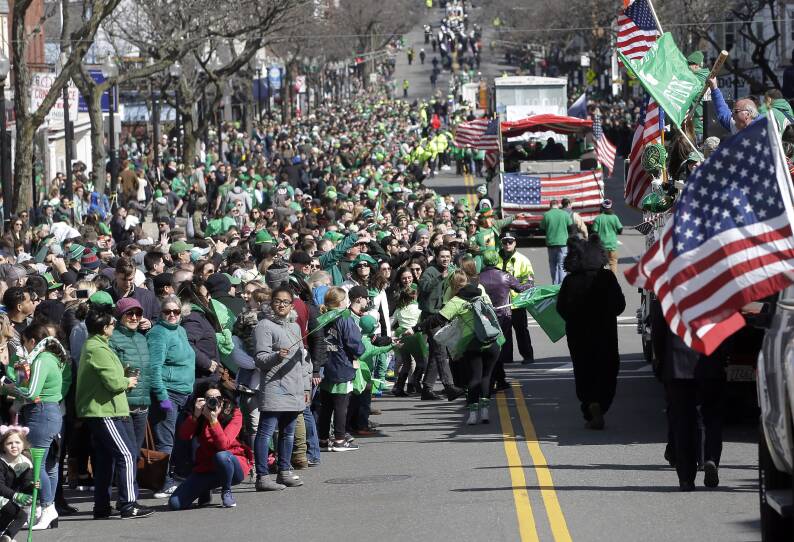Last year after a neo-Nazi group displayed a banner at the St. Patrick's Day Parade that read "Keep Boston Irish" local leaders pledged to prevent a repeat of the incident, which received international coverage.
Over the past weekend, U.S. Rep. Stephen Lynch, state Sen. Nick Collins, Boston City Council President Ed Flynn, state Rep. David Biele and at-large City Councilor Michael Flaherty signed a joint letter to MBTA police Chief Kenneth Green requesting that MBTA officials take steps to keep right wing extremists away from this year’s parade, which takes place on Sunday, March 19.
Lynch said these extremist groups, that include NSC-131 or Nationalist Social Club, carried out violence and intimidation aboard subway and commuter trains heading into South Boston around the time of the 2022 parade.
“They were damaging MTA property, commuter rail property, and there were confrontations in transit," Lynch told GBH News. "And if we had had early intervention, I think we might have stopped some of these groups from actually getting to the parade.”
On social media, some expressed concerns about violating the first amendment rights of right wing protesters. Collins, who represents South Boston, said those fears are misplaced.
“Folks are concerned about the curtailing of free speech and the First Amendment. We're not talking about that," Collins said. "They defaced public property, and that's against the law. So we're sending the message out that if you break the law, you'll be held accountable.”

This year’s parade is predicted to bring up to a million people into South Boston, a neighborhood of about 35,000 people.
“So most people coming in that day are visitors, celebrating our roots, our heritage, our multicultural communities,” said Collins. “What we're trying to ensure is that happens from beginning to end. And for most people that starts with a ride on the T.”
On a Telegram channel last year, right-wing extremists referenced the 1970s racial violence against school integration to support their belief that they had local support. South Boston, or Southie as it is known locally, at the time was a mainly white Irish American neighborhood, and was a hotbed of opposition to school busing.
Lynch said that was a long time ago, and since then South Boston has become a majority-minority population. And in a pointed message to NSC-131, Patriot Front and other extremists, Lynch offered a reminder of a time “when the Ku Klux Klan came to South Boston and they were ridden out on a rail. They wrongfully assumed that that there's fertile ground here for that hate.”
Local antifascist filmmakers Lauren Pespisa and Rod Webber are skeptical of the political response to the threat posed by hate groups, describing it as “rhetorical.” Pespisa and Webber last March saw a social media post live-tweeting the presence of NSC-131 at the parade. They said they jumped into a car and made their way to South Boston where they confronted members of the group with a sign and chants, and accused the Boston police of “standing by doing nothing.”
Pespisa told GBH News she would advise parade goers to physically protest: “If you see something, do something,” to demonstrate that Nazism will not be accepted in “any community.”
Collins said he doesn’t disagree, but says whatever action is taken should be in coordination with law enforcement.
“When you see these messages [hate banners and stickers] are being put up on public property or assets, you know, they have to come down right away," Collins said. "If you see this happening ... notify the transit police, if it's on the train system or if it's inside the city of Boston.”
Lynch said the leaders have asked the MBTA to put on extra staff the weekend of March 19 and “to be more keenly aware of the possibility of some of these hate groups trying to capitalize on a family parade environment to showcase their hate and intolerance.”
T superintendent Richard Sullivan said in a written statement the Transit Police will have an enhanced security plan for the parade. Massachusetts U.S. Attorney Rachael Rollins also has also issued a reminder to residents who suspect white supremacist activity that they can report it by calling 1-83-END-H8-NOW (1-833-634-8669).
Officials including Rollins, Mayor Michelle Wu, and Attorney General Andrea Campbell will meet with police and the FBI a few days before the parade to discuss safety and crowd control.
WATCH: Combatting hate at the St. Patrick's Day Parade





